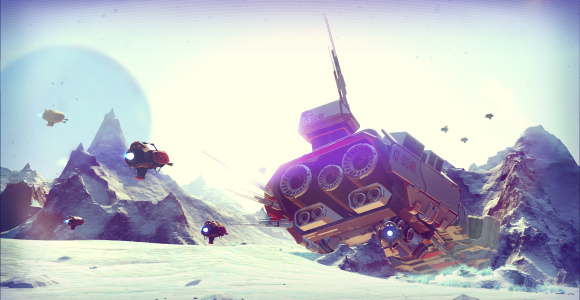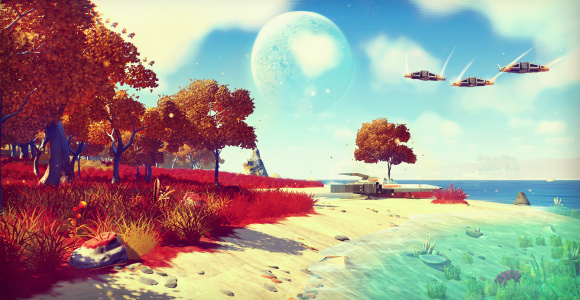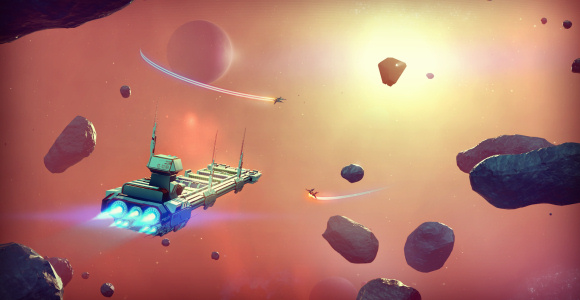I don’t care to venture into the open world.
Skyrim. Watch Dogs. Grand Theft Auto V. I don’t often touch these kinds of games because they’re so … well … big. Playing them is like adopting a second, much more fantastical life. Instead of washing the dishes and folding laundry in your two-bedroom apartment, you’re building and maintaining a virtual homestead in an old fantasy kingdom once ruled by elves. Or killing rats for someone because they’re eating her pillows.
That’s not to say I haven’t played my share of open-world games. Assassin’s Creed, Batman: Arkham City, and Infamous are among my collection. But there’s a difference between a sandbox game that can be beat in 15 hours and an adventure that easily stretches into the hundreds. I’m filling in the role of hero for a short stay, not planning out my career and retirement. I don’t want to roam the streets, idly deciding how to spend my time next.
I’m wary of one word: “freedom,” and plenty more of it. More freedom means more to customize, more to explore, more to collect and complete. Ubisoft, the maker of open-world games Assassin’s Creed and Far Cry, is all about this. Its latest game, Watch Dogs, takes between 35-40 hours on average. That’s going to be the new normal.
Ubisoft CEO Yves Guillemot might think gamers want more freedom, but I don’t. And there certainly aren’t “less games now,” as he claims. Not since the indie movement happened, along with the advent of digital distribution.
The idea of open-world games is alluring: We want to explore a world so real and immersive that it can offer us the fullest escape possible from our own. But creatively speaking, as soon as you remove the invisible boundaries that separate the linear from non-linear, we cease to discover a story that’s compelling. Level editors, quest creators, and the overwhelming amount of mindless fetch quests and drudge missions in open-world games have taught me to stay far, far away.
But maybe going as far away as space is the answer. No Man’s Sky, one of E3’s biggest marvels this year, could be the one truly open-world game I can get behind, because it promises something a little different.
For one, it’s not fantasy (The Elder Scrolls) or urban (Watch Dogs, GTA, Tom Clancy’s The Division) or even post-apocalyptic (Dead Island, DayZ). It’s just sci-fi. Hard sci-fi, like the stuff of Isaac Asimov. And except for Bungie’s upcoming Destiny, I don’t know many open-world games that remotely fit that description.
No Man’s Sky, a curiosity from the small indie team at Hello Games (the guys that made the Joe Danger stunt-racers, of all things), is about exploration, like many other titles in the genre. It’s about the unknown—what’s out there in space and on unidentified planets. But it’s not bogged down by repetitive missions or quests. If you want, all it can be is about charting the final frontier. As Hello Games managing director Sean Murray explained, “it’s not just wandering about passively.”
Which brings me to the amazing, sometimes colossal creatures we saw in the E3 trailer. Combat is a part of No Man’s Sky if you want it to be (keyword “if”), but you won’t be killing everything you come across for XP. “Planets have an ecology, they have an ecosystem, and you’re not necessarily at the top of that chain,” said Murray. For once, discovery in games could be about more than ownership; it could actually teach harmony and involve abiding by laws more natural and omniscient than human society’s.
Unlike other open-world games, too, No Man’s Sky is a solitary experience. You’re not in a crowded city or plain crowded at all. Although it’s an online multiplayer game, it’s not an MMO. It’s massive but not massively multiplayer, at least not in the way we’re used to. Since players are scattered light years away, you may never meet another single person. It’s just you and the universe.
What makes it unique, then, and what may save it from falling victim to the same problem that seems to plague every open-world game that offers too much “freedom,” is that you won’t lose that driving story. You are an explorer. You’re not a superhero, not a Dragonborn, not a criminal or an assassin or a hacker extraordinaire. You’re just some guy (or girl, since it’s first-person) thrust into the galaxy, a speck against the black.
And it’s not just your story. The game isn’t dictating to you the destiny of the universe, how you fit into it, or even how you should play it. You and the thousands of other players who will be investigating the same great expanse are charting it with you on one giant galactic map to the stars. What you find and choose to contribute to that map is up to you.
“No one person can even visit a fraction of this universe alone,” said Murray.
And the universe is an intelligent one. Because every “atom” of No Man’s Sky is procedurally generated—which involves defining probabilities of encounters, not hand-placing objects and living things, to allow for a different experience each time—there’s a science and reason to everything. The clouds are there for weather. The composition of water is molecularly, chemically broken down, creating literal atmosphere.
Hello Games wanted to engineer meaningful experiences, not a game on-rails, in a dangerous universe you’re exploring from the outside in. No Man’s Sky may balance survival and exploration better than the roguelikes like Don’t Starve, where the pressure of the clock is on you, splitting your time. Yet it may offer you more “freedom” than an open-world game wrapped in a story campaign you can’t escape, because even those games have limits. No Man’s Sky sounds limitless.
I can’t wait to carve my initials on the side of a planet.
Stephanie Carmichael writes about video games, comics, and books when she’s not helping teachers and students have fun together with Classcraft, an educational RPG. Find her on her blog or on Twitter.
Are you following The Mary Sue on Twitter, Facebook, Tumblr, Instagram, & Google +?











Published: Jul 4, 2014 01:01 pm